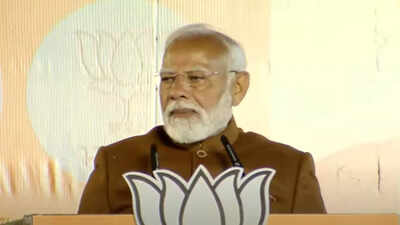NEW DELHI: Prime Minister Narendra Modi’s foreign policy demonstrates proactive engagement, exemplified by the implementation of the Act East Policy.
The Look East policy, initiated in 1992, primarily concentrated on economic relations with Southeast Asia. In 2014, PM Modi revitalised India’s foreign policy approach by transforming it into the more comprehensive Act East Policy (AEP), emphasising concrete actions and results.
This transformation represented a substantial strategic shift, incorporating enhanced diplomatic relations, robust trade collaborations, increased security partnerships, and cultural interactions with Southeast Asia and the broader Indo-Pacific region. The Act East Policy established India as a crucial participant in regional matters.
PM Modi has conducted numerous visits to neighbouring countries to strengthen bilateral relations.
His visits to Singapore (2015, 2018, 2024) have enhanced economic and fintech cooperation, whilst three visits to Indonesia (2018, 2022, 2023) have expanded maritime security collaboration.
The Prime Minister’s 2017 visit to the Philippines, the first in 36 years, reinforced India’s position in ASEAN security and commerce. His groundbreaking 2024 visit to Brunei, unprecedented for an Indian PM, demonstrated India’s expanding diplomatic reach. A significant milestone was achieved when PM Modi hosted all ASEAN leaders as Chief Guests at India’s Republic Day, commemorating 25 years of ASEAN-India Dialogue Partnership.
His diplomatic itinerary has included visits to Myanmar, Malaysia, Thailand, Laot and Vietnam, advancing India’s strategic and economic interests regionally.
India-ASEAN trade witnessed substantial growth under PM Modi’s leadership, increasing from USD 71 billion in 2016-17 to exceed USD 130 billion by 2024. India currently ranks as ASEAN’s 7th largest trading partner, whilst ASEAN holds the position of India’s 4th largest trading partner.
The Modi administration has prioritised infrastructure development, including the India-Myanmar-Thailand Trilateral Highway, to enhance trade and connectivity. Air connectivity has significantly improved, with direct flights now linking India to various ASEAN nations, facilitating commercial, tourism and cultural exchanges.
The Agartala-Akhaura railway project, connecting India’s Northeast with Bangladesh, represents a significant infrastructure development that has enhanced bilateral trade and connectivity.
The AEP’s strategic and defence component has received substantial attention. India has strengthened maritime security cooperation, particularly with the Philippines and Vietnam. A significant achievement was the sale of BrahMos missiles to the Philippines, establishing India as a credible defence supplier. Military logistics agreements with Vietnam have expanded India’s Indo-Pacific security presence.
The 2019 launch of the Indo-Pacific Oceans Initiative (IPOI) aimed to ensure maritime stability and navigation freedom. The inaugural India-ASEAN joint maritime exercise in 2023[1] demonstrated enhanced security cooperation in the South China Sea and Indo-Pacific region.
Cultural and interpersonal connections have been crucial in strengthening India’s Southeast Asian relationships. The AEP has reinvigorated shared Buddhist heritage with Myanmar, Thailand, Laos, Vietnam, and Indonesia, fostering historical bonds.
Nalanda University has awarded scholarships to over 300 ASEAN students[2], whilst the government has facilitated educational and cultural exchanges.
International Yoga Day’s growing popularity in Southeast Asia demonstrates the effectiveness of cultural diplomacy under AEP.
Singapore pioneered fintech connectivity with India, establishing a framework for digital and economic collaboration across ASEAN.
India provided medical support to ASEAN nations during the COVID-19 pandemic.
India has consistently provided regional humanitarian assistance, including USD 4 billion in aid and supporting Sri Lanka’s USD 2.9 billion IMF package in 2022-33.
In 2018, India supplied 1.7 lakh tonnes of wheat and 2,000 tonnes of Chana Dal to drought-affected Afghanistan.
Operation Maitri deployed military and rescue teams to Nepal following the 2015 earthquake.
The decade-long implementation of AEP has established India as an influential Southeast Asian participant. The policy has evolved from its trade-focused predecessor into a comprehensive strategy encompassing diplomacy, defence, connectivity and culture.
PM Modi’s consistent engagement, diplomatic summits and strategic partnerships have strengthened India’s Indo-Pacific presence, establishing the nation as a regional leader.


